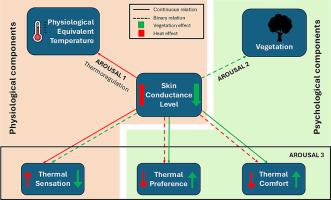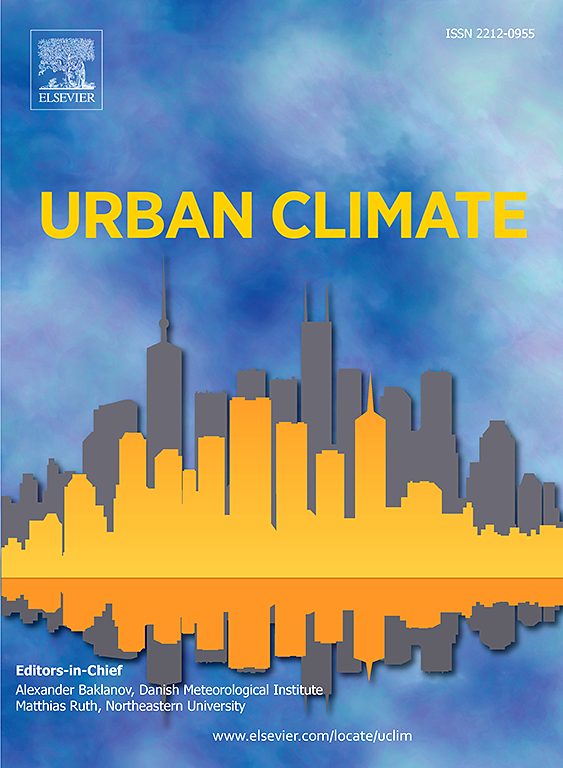植被对热应力的复杂影响——真实的还是虚构的?测量植物的心理效应
IF 6.9
2区 工程技术
Q1 ENVIRONMENTAL SCIENCES
引用次数: 0
摘要
研究表明,植被对人类有益,如改善空气质量、调节热量和减轻压力。目前还没有强有力的证据表明,植被具有可测量的心理效应,可以增强热舒适和减少热应激,并且除了其公认的生理效应之外,这种效应是明显的。在温暖的环境中,有大量植被的个体比在相同的生理等效温度(PET)但植被较少的类似环境中感到凉爽。我们首次提供了量化植被景观指数(VVI)对热舒适和热应力的心理影响的经验证据。一项有322名参与者参加的户外研究表明,当平均PET超过~ 32°C时,植被在人的视野(FOV)中的存在对热感觉、热舒适和热偏好有积极影响。热舒适和偏好投票随着VVI的增加而改善,热感觉投票随着VVI值的中位数增加而逐渐降低~ 9%。这些主观反应伴随着参与者生理应激水平的可测量和显著差异,如皮肤电导水平评估,生理等效温度超过~ 31°C。植被的有益效应随着植被景观指数的增加而增加,特别是在覆盖度中位数为11%时,但这种效应是非线性的。这些结果表明,在类似的高温气象条件下,植被对减少热应激的心理和生理贡献是一致的。本文章由计算机程序翻译,如有差异,请以英文原文为准。

The complex effect of vegetation on thermal stress - real or imaginary? Measuring the psychological effect of vegetation
Studies show beneficial effects of vegetation for humans, such as improvement of air quality, heat moderation and stress reduction. It is also assumed, so far with no robust evidence, that vegetation has a measurable psychological effect that enhances thermal comfort and reduces thermal stress, and that this effect is manifest in addition to its well-established physiological effect. Individuals in a warm environment feel cooler in the presence of extensive vegetation than in a similar setting with an identical Physiological Equivalent Temperature (PET) but less vegetation. We provide, for the first time, empirical evidence that quantifies the psychological effect of the Vegetation View Index (VVI) on thermal comfort and thermal stress. An outdoor study with 322 participants showed that when average PET exceeds ∼32 °C, the presence of vegetation in a person's field of view (FOV) has a positive effect on thermal sensation, thermal comfort and thermal preference. Thermal comfort and preference votes improved as VVI increased, and thermal sensation votes were progressively lower, as VVI values increased up to a median of ∼9 %. These subjective responses were accompanied by a measurable and significant difference in participants' physiological stress levels, as assessed by skin conductance level, for a Physiological Equivalent Temperature of more than ∼31 °C. The beneficial effect of vegetation increased with an increase in the Vegetation View Index, particularly from a median coverage of ∼11 %, but the effect was nonlinear. These results demonstrate psychological and physiological contributions of vegetation to thermal stress reduction, as recorded simultaneously under similar hot meteorological conditions.
求助全文
通过发布文献求助,成功后即可免费获取论文全文。
去求助
来源期刊

Urban Climate
Social Sciences-Urban Studies
CiteScore
9.70
自引率
9.40%
发文量
286
期刊介绍:
Urban Climate serves the scientific and decision making communities with the publication of research on theory, science and applications relevant to understanding urban climatic conditions and change in relation to their geography and to demographic, socioeconomic, institutional, technological and environmental dynamics and global change. Targeted towards both disciplinary and interdisciplinary audiences, this journal publishes original research papers, comprehensive review articles, book reviews, and short communications on topics including, but not limited to, the following:
Urban meteorology and climate[...]
Urban environmental pollution[...]
Adaptation to global change[...]
Urban economic and social issues[...]
Research Approaches[...]
 求助内容:
求助内容: 应助结果提醒方式:
应助结果提醒方式:


